November 23, 2009
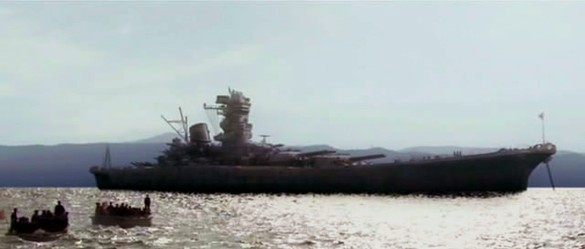
But the main character in this movie is the Yamato herself. No expense was spared in the making of this epic film, including a 1:1 scale set of the forward section of the ship, and the port side of the island area (the anti-aircraft guns in particular) that cost ¥600 million (nearly $7million).
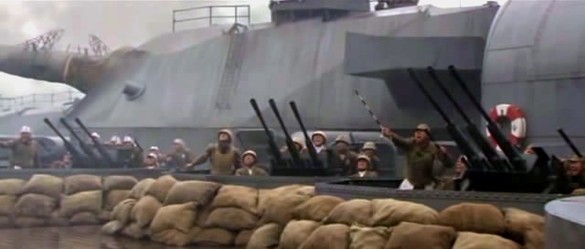
While the producers did wind up reusing a lot of the CG footage in the two major battle scenes, it's barely noticeable amidst all the chaos of war. And make no mistake, this movie pulls no punches when it comes to the combat... if you can't stand the sight of blood, this is not the movie for you.
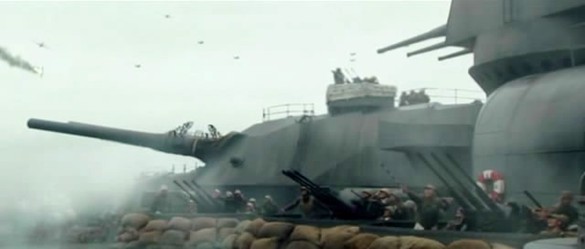
If you can stomach seeing people opened up by machine-gun rounds and the deck running red with blood, however, what you'll get is a war movie that ranks up near the top of the list. It's not as good as Saving Private Ryan or the HBO miniseries Band of Brothers, true, but it's lightyears ahead of, say, Tora Tora Tora or Midway.
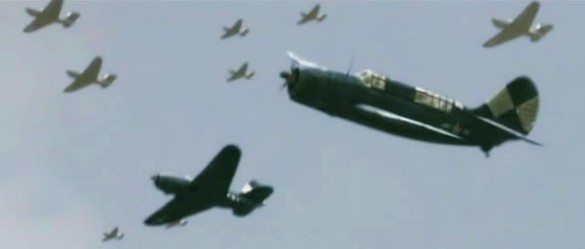
While this screencap makes it look obvious that we're looking at models or CG, in motion it's nearly flawless. The amount of detail is immense, both in the planes and in the Yamato herself.
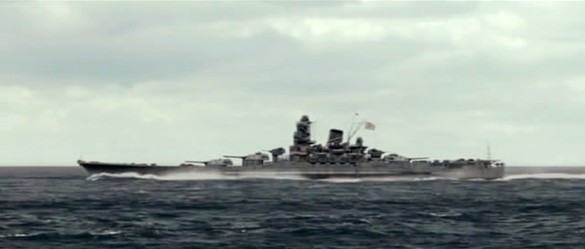
But when the final attack begins, the great ship goes to hell in a hurry. You barely notice that the whole fight is nearly 30 minutes long.
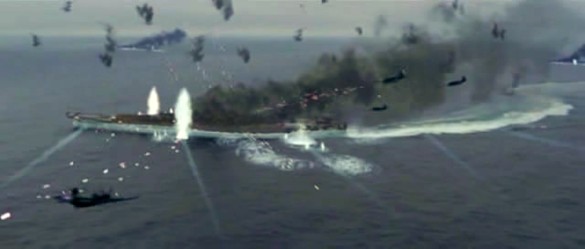
The sailors aren't supermen. There's no "one man shooting down a squadron", or even a single plane, like you might see in an American war movie. They're just there to serve the guns, and die. And die they do, in droves.
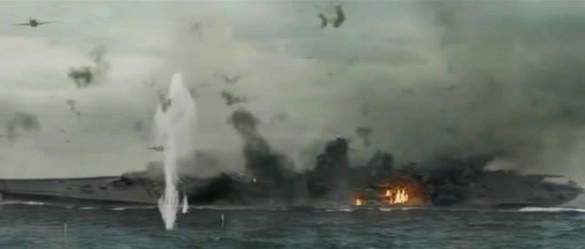
If you can find a copy of the movie, I recommend it heartily. It's well-done, historically accurate, and beautifully shot. You get the feeling that you're watching a documentary on the shipboard life of the Yamato, rather than a feature film, but it's never dull, despite the 2-1/2 hour length.
It's not perfect, but it's plenty good, and a fitting tribute to the men who crewed her.
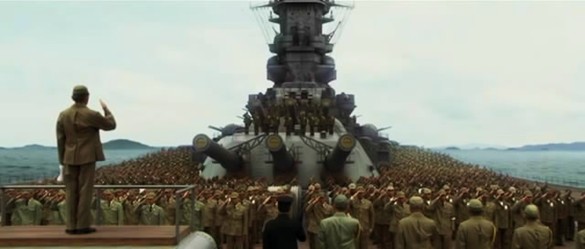
Posted by: Wonderduck at
09:51 PM
| Comments (7)
| Add Comment
Post contains 409 words, total size 3 kb.
It was the ultimate kamikaze mission. It's sad to see that many good men sacrificed for essentially no gain.
There was virtually no chance of Yamato succeeding in the mission it was assigned, and even if it had succeeded it would have been a bad ending for a good ship. Their orders were to beach the ship and to use their guns to provide fire support for the infantry, for as long as fuel and ammunition lasted.
But between code breakers reading Japanese dispatch orders, and picket submarines seeing them coming, and Mark Mitscher's carriers, they had no chance of getting close to Okinawa. One afternoon of flying by a fraction of the American planes in the vicinity, and Yamato was doomed.
It was actually a dive bomber that administered the death blow, though it took a long time to make a difference. One of the very first bomb hits set off fires that were never controlled. Eventually the fires reached the magazine for number 2 turret and set off the ammunition there, causing the ship to blow in half.
Simply a waste of good men.
Those pictures look fabulous. Did you managed to acquire a DVD?
Posted by: Steven Den Beste at November 24, 2009 12:30 AM (+rSRq)
It's never been released here, it appears.
Posted by: Wonderduck at November 24, 2009 08:24 AM (C32SO)
Actually, the Yamato had already capasized and sunk by the time the magazine exploded. The US Navy had learned a lot when they sank her sister Musashi at Sibuyan Sea during the Battle of Leyte Gulf (Namely, have all the torpedo bombers consistently go after one side of the ship - spreading the torpedoes on both sides just made the Japanese damage control efforts easier.). And it was later determine that magazine 1 was the one that exploded - which might not have been from the fires caused by the bombing (The primary bomb load-outs of the dive bombers and fighter-bombers from Task Force 58 was geared to knocking out the topside stations - it would have taken a properly dropped 2000 lb AP bomb to break through Yamato's deck armor.).
And the truly frightening part? Task Force 58 only used the aircraft from 2 1/2 of her 4 carrier groups to sink the Yamato and her escorts (One carrier group was conducting UNREP at the time and could not arrive back in time. Another one had most of their strike get scrambled due to awful weather.). Most of the Japanese were shocked at the sheer number of American aircraft coming at them - each time the first couple strike waves finished, the Japanese thought the Americans had shot their bolt...Right up until the next wave arrived.
I do like how they managed to get the SB2C Helldivers correct.
Anyone who does not read Japanese could do a lot worst than read A Glorious Way to Die by Russell Spurr, which covers both the Japanese and American side of the battle. It is definitely not the most authortative book, but definitely the most readable. The most emotionally powerful book available is supposed to be the translation by Richard Miniter of Requiem for Battleship Yamato, which was written by her assistant radar officer. Never read it myself, but it has an excellent reputation by those who have.
C.T.
Posted by: cxt217 at November 24, 2009 03:24 PM (QSek/)
Posted by: Wonderduck at November 24, 2009 06:35 PM (C32SO)
Posted by: Jcarlton at November 27, 2009 06:24 PM (mKHVN)
The DVD is on sale for ¥2992 on Amazon Japan, and I've been meaning to put in an order soon, so I'll pick up a copy. Even at the current heart-breaking exchange rates, that's not a bad price.
It looks like the author has a lengthy non-fiction version of the story, plus two novels, the second one titled Onna-tachi no Yamato. Its cover picture and blurb make it sound like the framing story that IMDB describes for the film.
-j
Posted by: J Greely at November 28, 2009 10:50 AM (2XtN5)
Hey C.T.
I'm sorry to have to be the guy to tell you this, but EVERY aircraft carrier that could launch airplanes in Task Force 58 sent aircraft to try to sink the Yamato task group! EVERY ONE of the twelve aircraft carriers sent out aircraft - ALL of Task Groups 58.1 (4 carriers), 58.3 (5 carriers) and 58.4 (3 carriers).
And Russell Spurr's book is better than nothing, but it is replete with errors. If this were to be a person's only source about the attacks on the Yamato task group, then a person's knowledge would be very slanted indeed. I have listed a bunch of Mr. Spurr's errors, and can make them available if you're interested.
Yamatodebunker
Posted by: David F. Anderson at December 27, 2009 01:06 PM (2kPCR)
46 queries taking 0.0691 seconds, 168 records returned.
Powered by Minx 1.1.6c-pink.









